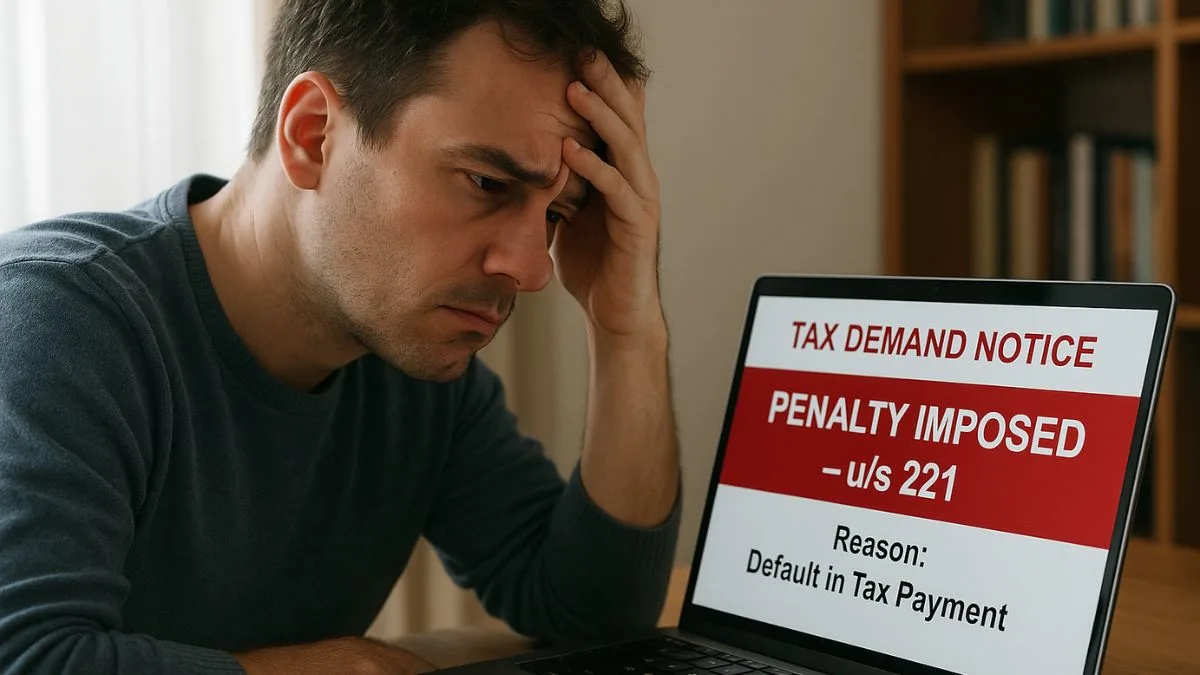
When it comes to income tax compliance in India, Section 221 of the Income Tax Act is one of the most crucial provisions that taxpayers must not ignore. Introduced to penalise tax defaulters, this section grants power to the Assessing Officer to levy penalties on those who fail to pay taxes as required under the Act. Whether you're a salaried employee, self-employed professional, or a business owner, understanding section 221 of the Income Tax Act can save you from unnecessary financial stress and legal troubles.
What is Section 221 of the Income Tax Act?
Section 221 of the Income Tax Act, 1961 deals with the penalty for default in payment of tax. If an assessee fails to pay the demand raised under Section 156 (Notice of Demand), the Assessing Officer may impose a penalty. The maximum penalty can go up to the amount of tax in arrears. However, the penalty under section 221(1) of the Income Tax Act is not automatic. It depends on the taxpayer’s conduct and whether the Assessing Officer finds “good and sufficient reason” for the default.
Key Features of Section 221
- Penalty Provision: The defaulting taxpayer is liable to pay a penalty in addition to the tax due.
- Discretionary Power: The Assessing Officer has discretionary power & may choose not to levy a penalty if there is a valid reason for the default.
- Notice Requirement: Before imposing the penalty, the assessee is given a chance to explain the reason for non-payment."
- Maximum Penalty Limit: The penalty cannot exceed the amount of unpaid tax.
Penalty under Section 221 of the Income Tax Act
A penalty under section 221(1) is applied only if there is an assessed tax liability, and the taxpayer fails to pay it within the stipulated time. There is no fixed minimum penalty under this section. The officer can impose any amount, provided it doesn’t exceed the outstanding tax. This provision acts as a deterrent for tax evasion and enforces timely tax compliance.
For example, if a taxpayer has to pay ₹50,000 in taxes and fails to do so even after receiving a demand notice, the Assessing Officer can impose a penalty of up to ₹50,000 under this section.
When Section 221 Does Not Apply
Interestingly, the penalty under Section 221 of Income Tax will not apply if the assessee has filed a return of income under Section 139 and paid the self-assessment tax, even if a small demand is raised due to under-reporting. This ensures that minor errors are not harshly penalised.
Also, if the taxpayer genuinely faced hardships and had valid reasons for non-payment—such as hospitalisation, loss of job, or natural calamity—the Assessing Officer may choose to waive the penalty.
Important Terms and Clauses
- Notice under Section 221 Income Tax Act: This is issued before imposing the penalty, and the taxpayer is given a chance to respond.
- Penalty under section 221 of the Income Tax Act in Hindi: Many taxpayers look for explanations in Hindi, especially for notices and proceedings. The Act allows for notices to be translated or explained in regional languages if requested.
- Section 221 Income Tax Act 1961: This emphasises that the provision has been in place since the Act was enacted, highlighting its relevance in long-standing compliance frameworks."
Common Mistakes Leading to Penalty under Section 221
- Ignoring a notice under Section 221
- Non-payment of self-assessment tax despite filing returns
- Delayed payment of advance tax
- Not responding to under under-section 221 income tax queries by the department
- The assumption that small tax dues won’t invite penalties
Remedies Available for Taxpayers
If you’ve received a penalty notice under Section 221 of the Income Tax Act, don’t panic. You can:
- Submit a written explanation stating the reason for the default
- Request for waiver or reduction of penalty
- Approach the Commissioner (Appeals) under Section 246A
- File a revision petition under Section 264
Legal provisions like section 221(1) of the income tax and the broader income tax section 221 in Hindi give taxpayers multiple avenues to appeal or respond before any final order is passed.
Final Thoughts
Being penalised under section 221 of the Income Tax Act is avoidable if you stay proactive and responsible in your tax affairs. If you’ve received a notice or failed to make a payment, take action before the situation escalates. Sometimes, all it takes is a well-drafted response and a genuine reason to avoid hefty penalties.
Need help responding to a notice or resolving a penalty issue under Section 221? Get expert assistance today at Callmyca.com—your trusted tax support partner. Don’t let a missed tax payment become a costly affair!











